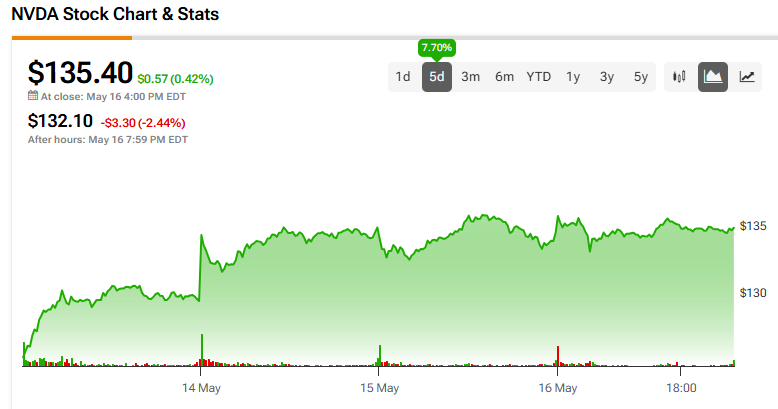First, we take Riad, then we take the world?!
Elevate Your Investing Strategy:
- Take advantage of TipRanks Premium at 50% off! Unlock powerful investing tools, advanced data, and expert analyst insights to help you invest with confidence.
After its well-documented trip to Saudi Arabia alongside President Trump, Nvidia (NVDA) continues to make pivotal strategic moves beyond the borders of Silicon Valley. The chipmaker is branching out, striking deals with countries and upstart cloud players to reduce its dependence on tech giants like Microsoft (MSFT), Amazon (AMZN), and Google (GOOGL). The message is clear: Nvidia wants to own the global AI game, not just play a part in someone else’s. NVDA stock is reacting positively to recent events, climbing over 7% in the past five trading days.

A Clear Strategic Pivot
This week, Nvidia announced a multibillion-dollar chip deal with Saudi Arabia’s Humain, a state-backed AI company. The aim is to build a massive 500-megawatt data center powered by over 18,000 of Nvidia’s latest Blackwell AI chips. Meanwhile, the UAE is teaming up with the U.S. to create one of the world’s largest AI data centers. These “sovereign AI” deals show just how serious the Middle East is about becoming an AI superpower—and Nvidia is right in the middle of it.
For Nvidia, this marks more than just a push to grow sales—it’s a clear strategic pivot. While more than half of its data center revenue still comes from major cloud providers like AWS, Azure, and Google Cloud, the company is now placing its bets on a new wave of partners. These include national governments and fast-rising cloud upstarts like CoreWeave (CRWV) and Crusoe. Known as “neoclouds,” these companies are getting early access to Nvidia’s most advanced chips, hands-on technical support, and in some cases, direct financial backing from Nvidia itself.
Moreover, it’s not just the Middle East that’s getting attention. Nvidia is also targeting enterprise customers who run their own IT infrastructure instead of relying on the cloud. It has partnered with companies like Dell (DELL), HP (HPQ), and Cisco (CSCO) to expand its reach into the corporate world.
Rolling Back Time
CEO Jensen Huang is all in on the plan. “I’m more certain about the opportunity beyond Big Tech today than I was a year ago,” he said. And with U.S. export policies shifting—especially as the Trump administration signals a rollback of AI chip restrictions—Nvidia stands to benefit even more abroad.
That’s especially important given Nvidia’s challenges in China. The company generated $17 billion from China last fiscal year (about 13% of total sales), but tighter export rules have made that business a lot tougher. Nvidia is now working on a downgraded AI chip for the Chinese market while boosting its presence elsewhere, including a new R&D center in Shanghai.
The bottom line is that Nvidia crafts and shapes its next move, whether to sovereign states, next-gen cloud players, or traditional businesses. Nvidia is positioning itself as the go-to provider for anyone building serious AI infrastructure.
Is Nvidia a Buy, Sell, or Hold?
According to Wall Street analysts, Nvidia has a Strong Buy rating and an average NVDA stock price target of $164.51. This implies a 21.50% upside potential.

















